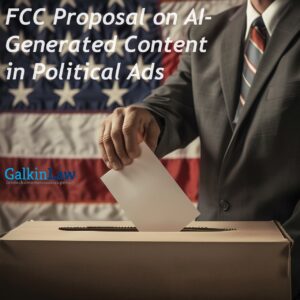
The upcoming presidential election has amplified worries about AI-generated content in political ads, prompting the FCC to propose new rules requiring disclosures in such ads on platforms under its jurisdiction. Here’s a brief summary and key points of the proposed rules:
Key FCC Requirements
- Definition of AI-Generated Content:
- Any image, audio, or video created using computational technology that depicts a person’s appearance, speech, conduct, or an event.
- Coverage of Rules:
- Applies to radio and TV broadcast stations, cable operators, Direct Broadcast Satellite providers, and Satellite Digital Audio Radio Service licensees.
- Excludes social media platforms and streaming services like AppleTV and podcasts due to FCC’s jurisdiction limits.
- Inquiry Requirement:
- Stations must inquire if political ads contain AI-generated content and inform requesters about the required disclosure.
- Disclosure Requirement:
- On-air announcement that the ad contains AI-generated content, made before or during the ad using standardized language, such as: “The following message contains information generated in whole or in part by artificial intelligence.”
Timeline and Potential Impact
- Earliest Effective Date:
- Given the typical timeline for FCC rulemaking, any final rules are unlikely to be effective until well after the 2024 presidential election.
Impact on Campaign Ads
- Transparency and Trust:
- These rules aim to enhance transparency, potentially increasing public trust in political advertisements.
- Compliance Challenges:
- Advertisers and broadcasters might face new compliance challenges, necessitating better AI-content tracking mechanisms.
- Voter Perception:
- Disclosure of AI use in ads could influence voter perception, making them more critical of content authenticity.
Chairwoman Jessica Rosenworcel emphasizes the necessity of these rules to safeguard democratic principles and ensure that voters are aware of AI’s role in political messaging.
#AI #FCC #PoliticalAds #Transparency #ElectionIntegrity
